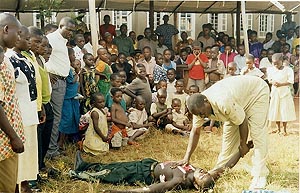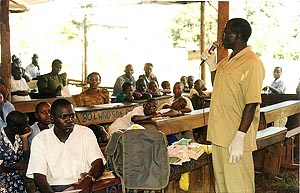

...with a smile on her face
Yesterday when I was doing emails in the internet café in Kampala, I observed yet another interesting "cultural experience." Now that I have a laptop computer I don't sit among their banks of computers, I go to the back, into the café itself, sit at a small round table, and link up. The electric and telephone cords are usually snarled up, the phone cords hanging from a nail (or fallen on the floor) and the multiple plug extension cords somewhere on the floor or under a table. Since I don't have electricity at home, I take advantage of the moment and charge up my cell phone at the extension cord as well. Now the 2 extension cords provided are very touchy, cheaply made plug-ins. Usually one is plugged into the only working socket in the other one. So often the cords must be jiggled and positioned "just so" to get connection with the electricity. So if someone else comes along and wants to plug in his laptop too, often he will dislodge another person's connections with jiggling his, and the whole situation becomes a delicate ballet of the cords.
I was all plugged in, linked up, and writing happily along when an Australian man came in and opened up his laptop nearby. Of course when he plugged in, my laptop and cell phone both lost their connections. So the cords again had to be jiggled around, and then his wouldn't make connection. The man became very frustrated and called for staff to fix the problem. The Ugandan guys came and patiently worked on getting the cords to all connect at the same time, of course causing both mine and the Australian man's cords to all blink off and on, frustrating the man even further. His voice became louder and he lectured them on the need for buying a new electrical extension. This went on for maybe 5 minutes, and I watched as I saw this man making a very small inconvenience into an unnecessarily bigger issue. He probably had not been in Uganda long enough to know that if anything has the slightest bit of function left in it, it is not replaced.
I must admit, I was a bit embarrassed by this man's behavior, his making a mountain out of a molehill, so to speak. After having lived in Uganda for nearly 5 years now, I've become used to their quiet, patient ways. The impatience and the loudness of many of the westerners really stands out to me, and at times, embarrasses me. The Ugandans around me were even discreet in how they observed this man, so he never even knew he was making a scene.
A bit later, a Chinese man came in and set up his laptop at another table. When I went to leave and began unplugging, his head turned around and I knew I'd just jiggled his cord and disconnected him. I apologized and started to bend down to fix his connection, but he motioned to me, "No, it's ok!" and got up and quickly fixed it himself, returning to his work. So simple, so quiet. No problem at all for this man…
This morning a little old lady came into my yard and greeted me, holding her butcher knife in her hand. She's a widowed granny with no family. I'd heard that she was having difficulties where she was living in another part of our village, and since I had a small, one-room house on my land, I invited her to come and stay there instead. She was so grateful that she immediately began digging in my garden with her hoe, harvesting my coffee, and this morning, she was pruning my bananas. Banana trees grow up tall, palm-like, the new leaves always coming up out of the top centers of the tree. As the old leaves on the lower outside die, they drop down alongside the trunks, making a brown skirt around the trunks of the trees. It's not only unsightly, but it attracts bugs that can harm the trees and fruit. So I have my workers prune them, cutting off all the dead leaves hanging down.
I watched her as she worked on a cluster of 3 trees, carefully pulling on the dead leaves, cutting them off, putting them into a pile to be used as mulch, then trimming up the trunks, working slowly and carefully, as African women have done for centuries. No hurry, just slow, steady work, doing a neat, careful job. Moving on to other trees and out of my sight…
This weekend, we buried a young mother in one of the nearby villages. She had died with a smile on her face, a face expressing great peace. I first met her several years ago when she spent 2 weeks in our clinic, for some now-forgotten reason, awaiting the birth of her child. She seemed ready to deliver and finally got tired of waiting, she and her mother walked home to their village. A week or so later, she delivered in her mother's tiny mud two-room, dirt floor hut -- TWINS! The babies were delivered by her mother, who was astonished to see the second baby appear as she was tending the first one. With big eyes, she reported to us, "I just kept praying!" as she was delivering the babies. None of us had suspected twins!
Within a year or so, one of the twins had died. Now the mother also had died. She had AIDS. She had been living a wild life, one of severe drunkenness, smoking, chasing. Some time back, she had been near death, and some of the local Christians prayed for her. God raised her up, but she resumed her careless lifestyle. She said, "I don't need your God!" People would find her passed out, drunk in the ditch - even when she was pregnant. She was not a candidate to die with peace and a smile on her face.
In Uganda when people die, they are laid out in the house for usually a day, while the family and mourners gather. They must be buried quickly in this hot, humid climate, because there is no embalming or refrigeration available to preserve the body. The women prepare food, the men dig the grave. Grieving can be very open, with loud wailing and crying. As we went into the mother's house, to sit with her and the body, as is customary, I was struck by the quietness. Even the sad-faced mother did not show tears at the time. There was no wailing. But when they pulled back the sheet from the dead woman's face for me to see her, I was struck with the expectant smile on her face. There are no morticians here to use makeup and to arrange faces into pleasing expressions; knowing her history, I was wondering what had happened.
As we went out to my truck to leave, two ladies followed us. They shared with us how they had been with the woman as she died, had prayed with her as she willingly accepted Jesus Christ as her savior, and asked forgiveness for all her sins. I don't know the exact time frame, but it looked to me as if she had looked up and smiled when she saw the angels coming for her, and then just left. One old man stated, rather indignantly, that no one could just get forgiven like that, and go to heaven after such a bad life. My immediate thought, of course, was, "Then what about the thief on the cross, next to Jesus?" That man was a convicted criminal, sentenced to die, but because he had believed, Jesus had told him, "TODAY you will be with me in paradise." But by the end of the burial, this lady's smile had convinced people that she had indeed died forgiven…
There is great suffering in Uganda, and other 3rd world countries. Romans 5:3 says that suffering causes us to develop patience. In the industrialized world, we have done much to alleviate suffering and to make our lives comfortable. Living in Africa has caused me to see more than the obvious material differences. We (speaking as an American) have become some of the most impatient people in the world. I often see Africans as patient as a rock, never in a hurry.
Patience is a virtue, highly spoken of in Scripture, but there is one thing we should never be patient about, and that is our search for God. We can never rest in peace until we know Him. Like this woman who died of AIDS, some will not find peace in Him until the last moment of life. But hopefully we will find Him, through Jesus, much earlier and be able to give Him the fruitfulness of our years. As for me, when my time comes, I want to go home with a smile on my face, bringing my fruit with me.
Margaret

|

|